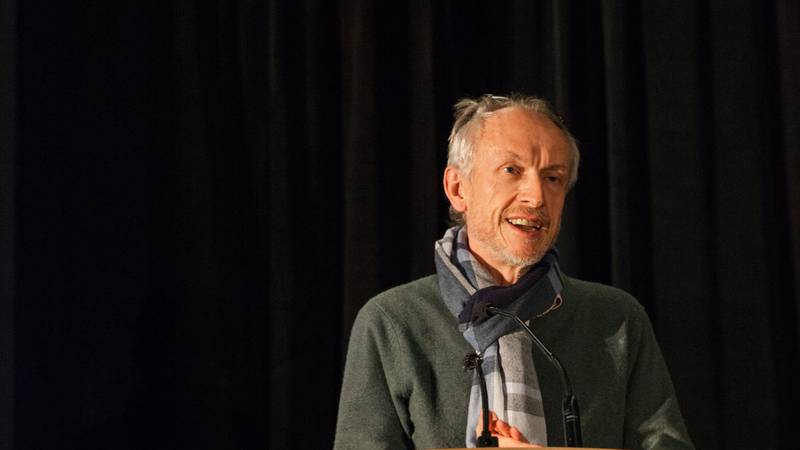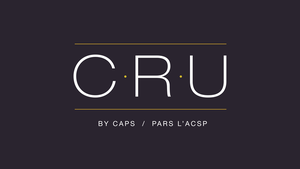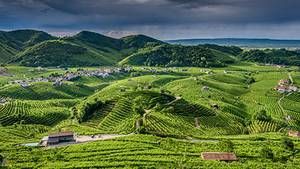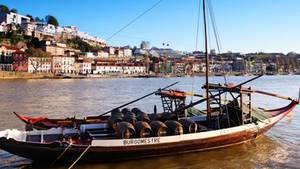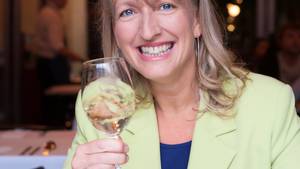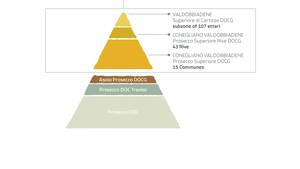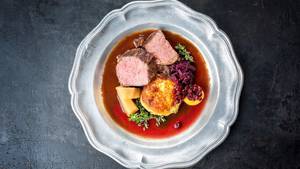Andrew Jefford is one of wine’s leading communicators, with columns in every issue of Decanter and World of Fine Wine. He is also the Co-Chair of the Decanter World Wine Awards and Academic Advisor to the Wine Scholar Guild.
Kim Gertler recently interviewed Andrew Jefford at the Vancouver International Wine Festival for crubycaps.ca. We’ll be bringing you that full interview soon, but in the meantime, Kim checked in for some insights from Andrew in the context of the current global pandemic.
KG: Andrew - so much has changed in the month since we spoke in Vancouver - I think it's safe to say that this is totally new ‘terroir’ for the world of wine. I really had to ask you some more questions. The first one being: as someone so connected internationally, can you put into context the impact of the COVID-19 crisis on our industry?
AJ: I can't give you many figures yet as all the dials are still spinning, but the crisis is colossal. Anecdotally, retail is holding its own or even surging, though I would imagine that the average bottle price is dropping steeply as everyone tightens their belts for the difficult months ahead. By contrast, the on-trade (restaurant trade) has wholly and shockingly collapsed, leading to acute difficulties for everyone involved in that sector. Vineyard tourism and wine events will be very hard-hit this year, too. I doubt any growth in retail would be sufficient to cover these other losses. Larger scale retailing businesses are, perhaps unfairly, the chief beneficiaries at present, while the hardest hit are small businesses and sole traders. In the wine-producing community, inventories will begin to swell, and the vines don't stop growing. Once again, the smallest and least well-established growers will be hardest hit. The next eighteen months will be very challenging.
“The emphasis will not be on exclusivity…but on survival…”
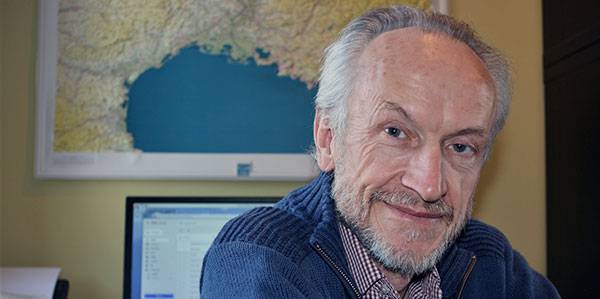
Andrew Jefford at home in Montpellier France
Credit: John Jefford
KG: How should we be planning to recover from this?
AJ: To recover, you need to survive first, both as a business and as an individual. April will be critical. We have to follow all the guidelines as strictly as we can, and where possible deep-freeze or anaesthetize businesses. The only route towards recovery is by going through the peak as swiftly as we can. The period that follows will be a convalescence -- nursing businesses and individuals back to health in a changed environment. That environment will emphasise simplicity, transparency, respect, open-sourcing, community initiatives, help for those who have selflessly given their all in the front line during the crisis. I realise that this sounds vague but once again it is hard to be specific until we have gone over the infection peak; I just feel the post-Covid trading atmosphere will be a very different one. The emphasis will not be on exclusivity, luxury and status any more, but on survival and creating sustainable global and community trade in a world which no longer takes anything for granted. We will have lost our innocence about pandemics but about much else as well. We will realise that the fabric of our lives can crumble in two or three weeks. We will also see, I think, is a very different atmosphere emerging with each new month that passes. April really will be about survival -- personal, national, economic -- but by May and June there will begin to be a lot of pent-up energy and innovation, even if we are not 'back to normal' by then. More specifically I see wine prices coming down sharply, and a renewed emphasis on value, authenticity and 'the local'. Everyone will pivot towards those kind of qualities. I hope by July and August some movement will be possible again, even if it is under changed 'rules of engagement' and perhaps only to those who have antibody test certificates. I would hope most restaurants will be able to plan on reopening around midsummer or shortly afterwards.
KG: Tell us about the situation where you live in France and also - how you are coping in your own home?
AJ: The French have in general responded very well and very efficiently -- but like everyone outside Asia, they didn't take the issue seriously enough to begin with, and the crackdown on movement and social mingling came too late. As everywhere, too, things are most difficult in large cities. There isn't enough testing. I live on the edge of a medium-sized city (Montpellier). It is very quiet where I live, everyone follows the rules, there is enough in the shops. Home life has changed in that my wife and I have two teenage sons who are at home all the time, with their schooling interrupted, and this is a challenge. We are a household entirely supported by freelance earnings, and so there are economic anxieties too. But we are trying to look on the bright side: we should be able to make it through four months by calling on reserves of various sorts, and we have a chance to have a very close period together as a family, to influence each other, to learn from each other, to share experiences and do things we would not otherwise have time to do. I have found the natural optimism of my sons a great support, for example.
“Wine is a kind of soulstuff, which can feed soul or spirit…”
KG: We are now living in a world where we are defining what is an essential service or thing - or not. Is wine essential?
AJ: I have never in the past assumed wine was essential; I have always felt it was 'the icing on the cake', and a kind of very interesting and very cultural confectionary for adults. No one needs to drink alcohol in the way that they need to eat food. Maybe wrongly, I sometimes felt that writing about wine was a rather decadent or at least superfluous activity.
But in fact this crisis has made me realise that perhaps it is more essential than I thought it was. Wine is a kind of soulstuff - a foodstuff, which can feed soul or spirit as well as body. I remember something my cancer-afflicted Dad said to me three years ago, at a time when he was living a very reduced and almost squalid life at home looking after my mother who had Alzheimer’s. (She has since died and he is now in a nursing home.) They used to have one glass of wine every night. "It's such a boon," he told me. "It puts the sunshine in my heart." This is a commonplace of the wine world but he really meant it; he felt that as I have never yet felt it, even now. It kept him going. And of course it is true. I think in fact that we have never needed 'the sunshine in our hearts' as much as we do at present, so paradoxically I think wine has become more important in the times of Covid19, not less. It's still not quite essential, but it is a great support in dark days.
KG: More than ever now we are using technology to communicate. Do you have any stories, tips or insights to share here about how wine enthusiasts, students, sommeliers, winemakers and other wine professionals can use technology to stay in touch, to learn, to network and keep business moving?
AJ: Social media is full of virtual aperos, virtual dinner parties, community meetings, conference calls, blog posts, creativity ... that's great, that's essential. Covid19 had attacked our conviviality and these are some of the ways in which we can sustain it. It is also a great opportunity to do some learning or research. I'm involved with the Wine Scholar Guild, which specialises in distance learning, and there has been a lot of uptick there. For others who normally live very busy professional lives, it's a chance to have a rest. Indeed apart from the economic stress, Covid19 is a kind of gift of time to most of us who aren't at the front line, and we are very lucky to be living in the age of tech and social media in order to make the most of this gift. The key is to remember that this gift of time is temporary and to make the most of it while we can.
KG: With so many of us facing health risks, layoffs, loss of income as well as the loss of family, friends and colleagues - can you share a glimmer of hope? Do you have any words of encouragement to offer?
AJ: Just survive, endure, support each other; we will emerge wiser and stronger. We will value our social lives and the conviviality of wine all the more afterwards, and we will think back fondly to what wine meant to us during the crisis.
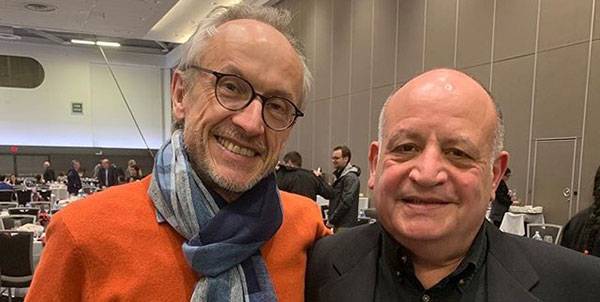
Andrew Jefford and Kim Gertler, in Vancouver, February 2020
Photo: Stefan Vanderland
@andrewcjefford | @kgertler

